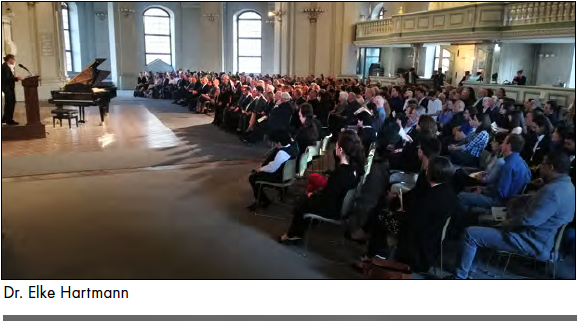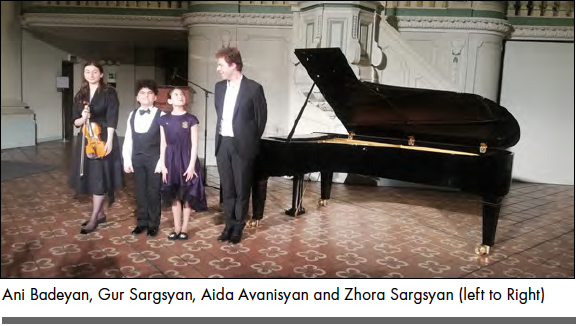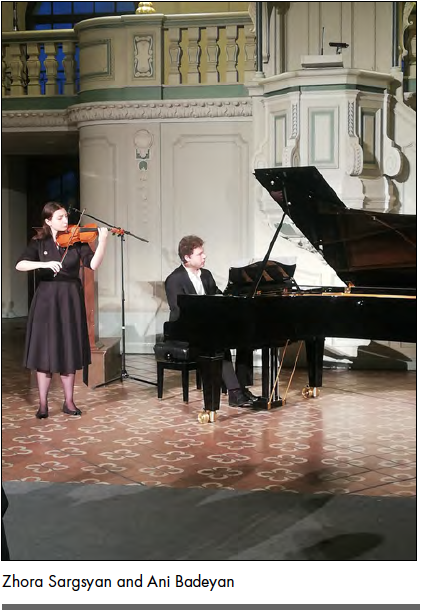Young Talents Honor the Memory of Genocide Victims in Berlin
May/02/2019 Archived in:Culture | Armenian Genocide
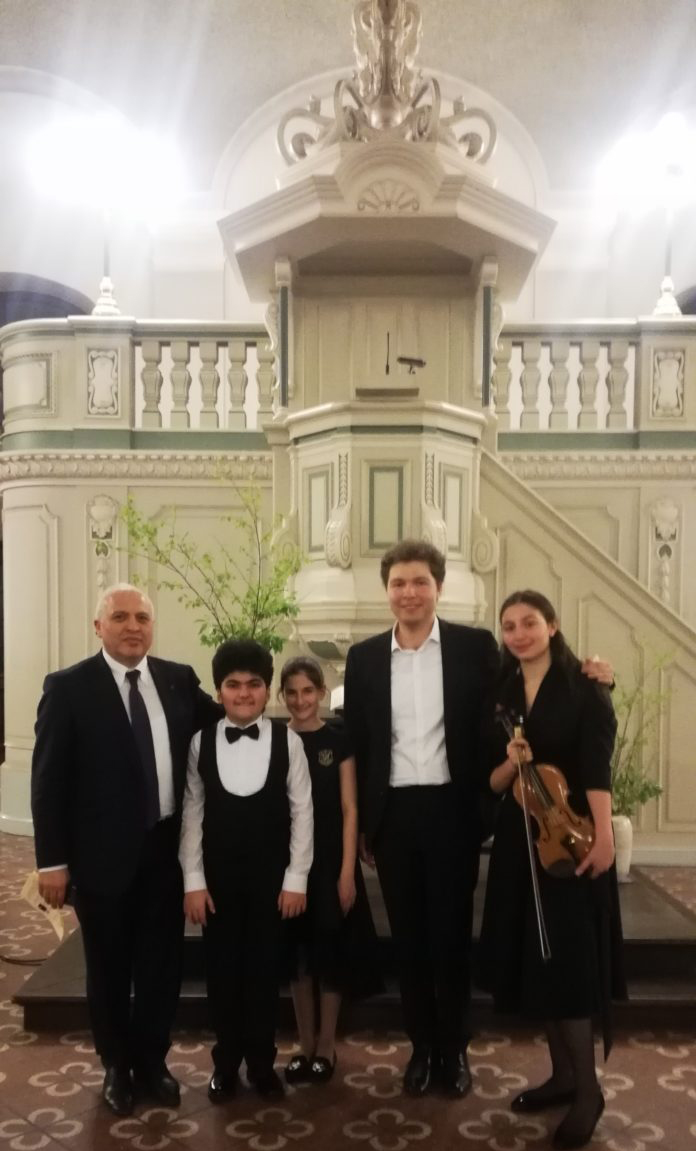
The four musicians with Ambassador Ashot Smbatyan (left)
by Muriel Mirak-Weissbach
BERLIN, MAY 2, 2019— The date was, as always, April 24, and the venue had not changed: the French Cathedral in Gendarmenmarkt, Berlin. But the organizers were many, the Embassy of the Republic of Armenia, the Diocese of the Armenian Church in Germany and the Central Council of Armenians in Germany, in cooperation with the Armenian Church and Cultural Community as well as the Armenian Community, both of Berlin; and Kammerton, a music initiative. The program presented one commemorative speech, delivered by Dr. Elke Hartmann, followed by a magnificent concert featuring four very talented young musicians from Armenia. The new Primate of the Armenian Church in Germany Archimandrite Serovbe Isakhanyan closed with prayers.
Dr. Hartmann, who is teaching as a guest professor at the Hamburg university this semester, is on the faculty of the Ludwig Maximilian University in Munich, in the department of Russian and Asian studies. In her address Hartmann spoke as a third generation Armenian, whose maternal grandparents transmitted Armenian culture to her, through language, music, cuisine and love. As that generation is taking its final leave, the descendants continue to fight for recognition of the genocide, especially on the part of the Turkish authorities today. Hartmann was direct and uncompromising in her demands for full recognition and her principled rejection of political exploitation through pseudo-acknowledgements and rhetorical lip-service to the suffering of the victims.
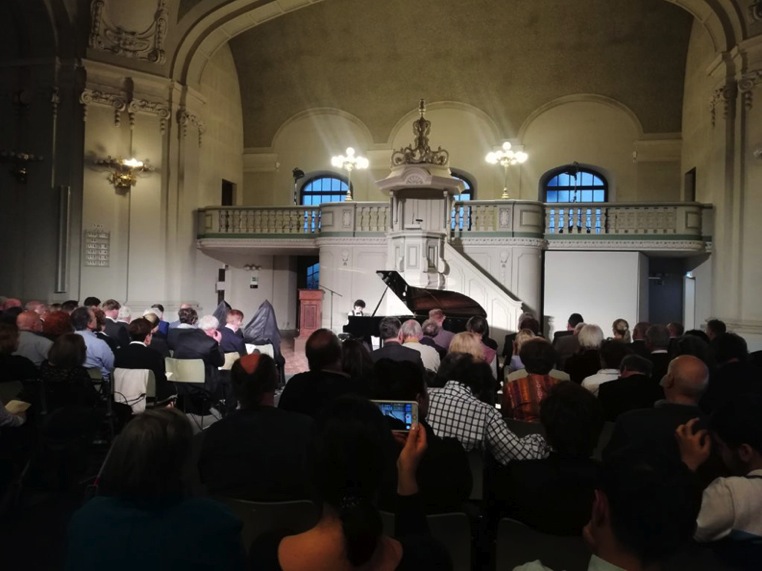
As a German, she emphasized the role that Germany must play, especially in the wake of the resolution passed in 2016 by the Bundestag (Parliament) officially recognizing the genocide. In that document, specific provisions are defined for implementation, among them the inclusion of study of the Armenian genocide in history classes in the upper schools. Matters pertaining to school curricula are the responsibility of the federal state governments in Germany, and it is they who must transform the written commitments into facts. But, as she stressed, to do this involves more than a bureaucratic decision; for teachers to prepare classes and present the subject in a scientifically responsible manner, they need research tools and classroom materials. This requires adequate research, which in turn calls for the establishment of centers, institutes, associations within universities that are devoted to Armenian studies. Without such chairs established for Armenian studies it would be impossible to fulfill the challenges and promises of the genocide resolution.
Reiterating the special place that music plays in Armenian life, Hartmann concluded her warmly received remarks with the invitation to the musicians to come on stage. If anyone in the capacity audience expected a few pieces by some world-class professional ensemble or vocalists, that person must be happily disappointed. The first to appear was Aida Avanisyan, age 12, who took her place at the concert grand piano and delivered Arno Babajanyan’s Elegy. Further on in the program, she would perform Johann Sebastian Bach’s Partita No. 2 in C minor and Franz Schubert’s Impromptu in A flat, Opus 90, No. 4. Her contemporary, Gur Sargsyan, also born in 2006, gave an energetic and convincing performance of Sergei Rachmaninov’s Prelude in G minor, Opus 23, No. 5, which is a technically challenging piece, not to mention interpretation. He was equally competent later in presenting Shushiki by Komitas, and Widmung (Dedication, A love song) by Robert Schumann in an arrangement by Franz Liszt.
The other two musicians were considerably older: pianist Zhora Sargsyan is 25 and violinist Ani Badeyan has just turned 16. As a soloist Sargsyan played Ballade No. 4 in F minor, Opus 52 by Frederic Chopin, the Phantasy in D minor by Wolfgang Amadeus Mozart and Spring by Komitas. In a duet together with Ani Badeyan, he performed Krunk by Komitas and the Romance from Henrik Wieniawski’s Violin Concerto No. 2, Opus 22. The program offered Komitas and other Armenian composers alternating with works from the classical European repertoire, a reflection of the range of musical culture the young instrumentalists are mastering.
After listening to one prodigious performance after the other, we were not surprised to read in the program notes that all four have won numerous prizes, both on the national stage and abroad. The two youngest pianists Gur Sargsyan and Aida Avanisyan, have both performed Bach piano concertos together with the State Chamber Orchestra of Armenia. With the exception of Zhora Sargsyan, who has been a student at the Berlin University of the Arts since 2014, the musicians came from Armenia for the event, and heartfelt thanks were in order to the Embassy for having facilitated their travel and to the KAMMERTON Project for the Promotion of International Musical Young Talents. This Berlin-based initiative supports the education of classical music talents, children and youth, and promotes international exchange. Before offering solemn prayers, Archimandrite Isakhanyan expressed his deep gratitude to the outstanding performers.
Hartmann had mentioned in her opening remarks that music has served Armenians throughout the ages as a means of affirmation of their continuing existence and development; the thoughtfully crafted program for this year’s commemoration, brilliantly executed by the young musicians, communicated this not only through their skills but also the pure joy they find in making music. It was a dignified commemoration of those who perished in the genocide and at the same time a celebration of the will to generate cultural excellence into the future.
